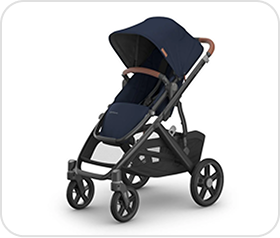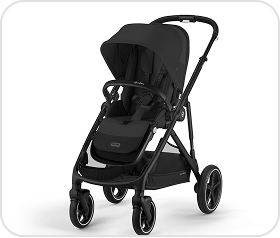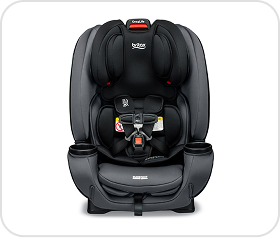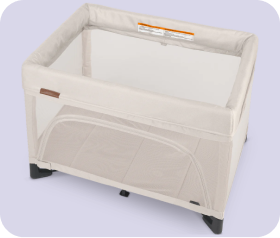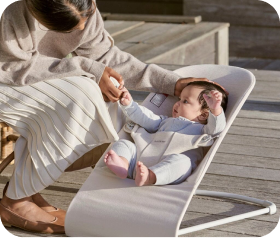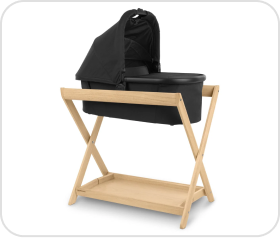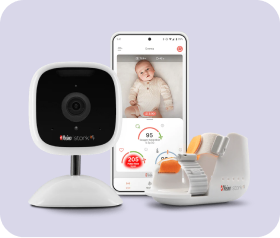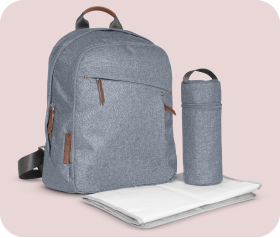
Everything you need to know about light weight infant car seats!
When pondering the purchase of a car seat, safety takes center stage in every parent's thoughts. Following closely behind is the consideration of weight, particularly when on the lookout for an infant car seat or a trusty travel companion. Parents to-be are well aware of the inevitable reality that they will be toting their newborns in their infant car seat wherever they go. While strollers act as reliable allies in sharing the load, the daily routine of lifting and carrying your little one in their car seat becomes a familiar task.
Imagine the repeated choreography of popping baby's infant car seat on and off its base during the routine transitions, transporting your baby from home to car, moving from car to store, doctor's office, climbing stairs, and various other daily scenarios. While the weight of infant car seats, hovering around 9 to 13 pounds, may not initially seem burdensome, keep in mind that your growing baby will contribute additional heft to the equation! As your baby reaches the 20-30 pound mark, you might find yourself managing a substantial 40 pounds on your arm.

Fear not, for you don't need the strength of a bodybuilder to navigate the world with your little one. Thanks to the evolution of baby gear and the marvels of technological advancements, infant car seats are now lighter than ever! In this article, we'll focus on the feather-light champions among car seats and explore how they continue to offer babies premium protection.
What are the lightest weight infant car seats?

The featherweight champions of infant car seats tip the scales at a mere 6 to 7 pounds! That's a delightful 3-4 pounds lighter than the majority of infant car seats you'll find in the US market – and as parents soon discover, every pound makes a difference! Without further ado, let's unveil the stars of the show, the lightest weight infant car seats:
- UPPAbaby Aria 6 lbs
- Nuna PIPA aire RX 6.2 lbs without canopy and inserts
- Nuna PIPA urbn 7 lbs without canopy and inserts
- Bugaboo Turtle Air 7.1 lbs without canopy and inserts
- Nuna PIPA RX 7.6 lbs without canopy and inserts
For full comparisons of these options check out these article:
- Nuna PIPA aire RX vs. UPPAbaby Aria
- Nuna PIPA Series Infant Car Seat Comparison
- Bugaboo Turtle Air vs. Nuna PIPA aire RX vs. Nuna PIPA RX vs. Nuna PIPA urbn
How are light weight car seats so light weight?
Brands committed to crafting remarkably light weight car seats are deliberate in their design journey. Firstly, they meticulously select premium light weight materials, from the shell to foam and fabrics. Secondly, they trim any unnecessary features that contribute to added weight. Take, for instance, the coveted non-rethread harness feature. Car seats equipped with a no-rethread harness boast a mechanism allowing the head support to effortlessly slide up and down, adjusting the height of the car seat harness. While this adds convenience for parents accommodating their baby's growth, it also introduces extra weight.
In the designs of Nuna and Bugaboo options, this mechanism is artfully absent, eliminating the additional weight it typically carries. While some might see this as a potential deal-breaker, it's crucial to recognize that rethreading a harness is not a daily task—it's likely to occur only once or twice throughout the duration of using an infant car seat. The rethreading process is straightforward, involving pulling the upper straps of the harness from the back of the seat through the harness slots to the front and then rethreading them through the next set of slots. This minor chore takes only a few minutes. For parents placing a premium on weight, the sacrifice of a non-rethread harness shouldn't be a deal-breaker!
Are light weight infant car seats safe?
First and foremost, it's essential to recognize that infant car seats consist of two distinct components: the infant car seat itself and its corresponding base. Notably, the most impressive safety features are embedded in these light weight car seat bases. The Bugaboo Turtle Air, Nuna PIPA aire RX, and Nuna PIPA RX bases all incorporate rigid latch, a stability leg, and an anti-rebound panel. The UPPAbaby Aria base also includes a stability leg and anti-rebound panel. On the other hand, the Nuna PIPA urbn is a baseless car seat with rigid latch directly integrated into the seat. Each of these features contributes to the overall safety of the seats, providing stability in the event of a crash.

Parents examining infant car seats in person often find themselves instinctively concerned when first handling a light weight option. This naturally raises the question: How can car seats weighing only 6 to 7 pounds maintain safety standards?
Let's tackle these concerns head-on! While we've already delved into how manufacturers of lightweight car seats carefully choose smart materials, it begs the question: What sets the materials in standard infant car seats apart from those used in these light weight alternatives?
A fundamental method through which car seats provide crash protection is by incorporating energy-absorbing foam. This foam envelops the car seat shell, residing beneath the fabric. True to its name, energy-absorbing foam serves to absorb impact energy, minimizing the energy transferred to the baby and consequently reducing the risk of injury.
However, it's crucial to note that not all foams are created equal. Conventionally, car seats have been lined with EPS foam, where EPS stands for polystyrene, commonly recognized as Styrofoam. Yet, the manufacturers of the lightest weight car seats have shifted away from the traditional EPS foam, opting for the incorporation of EPP foam. EPP stands for expanded polypropylene and is lighter weight than EPS foam.
EPS foam vs. EPP foam: What's the difference?
EPS foam is comprised of numerous small beads that can be molded into diverse shapes and sizes. While EPS foam can endure a fair amount of abuse, it is relatively inflexible and prone to breaking easily.
EPP foam is an elastic foam that boasts greater flexibility and durability. Unlike EPS foam, it is not prone to cracking or breaking.
Another crucial distinction to highlight is that EPS foams are known to off-gas. In contrast, the EPP foam used in Bugaboo, Nuna, and UPPAbaby's lightweight seats plays a role in earning them GREENGUARD Certifications. Additionally, EPP foam possesses the ability to resist mold and bacteria.
While both EPS and EPP foam-lined car seats pass US safety tests, meet regulations, and provide crash protection, the evident advantage lies with EPP foam.

Why aren't all car seat manufacturers switching to EPP foam?
Not all US car seat manufacturers have transitioned to EPP foam, primarily due to its higher cost and the extended manufacturing process associated with its incorporation into car seats. As a result, car seats featuring EPP foam tend to be positioned at a higher price point.
Should I purchase a light weight infant car seat?

When contemplating an infant car seat, safety should always be the top priority. Nevertheless, weight is also a factor parents should consider, as light weight car seats contribute convenience to the parenting journey. It's reassuring to know that parents have lightweight options available without having to compromise on safety! Thanks to Bugaboo, Nuna, and UPPAbaby, parents no longer face a dilemma of choosing between a light weight or safe option—they can have both!
Questions?
Strolleria is dedicated to making the gear buying experience less overwhelming for parents.
If you have more questions about light weight infant car seats, feel free to start a live chat or email us at customercare@strolleria.com.




































